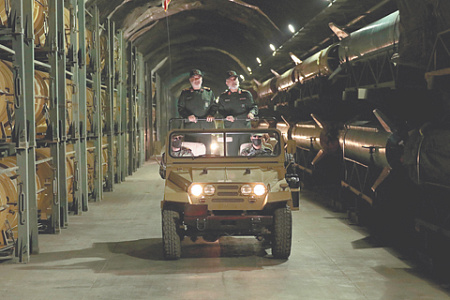
Iran has notified the UN Security Council of its right to respond in the event of a full-scale military confrontation with the United States and Israel. The reason to calculate such risks was the statements of President Donald Trump, who last weekend allowed the option of “unprecedented bombing” of the Iranian infrastructure. The Islamic Republic has warned that it is ready to attack almost 10 American military bases located in the Middle East. At the same time, Iranian politicians returned to the topic of a possible revision of the nuclear doctrine in favor of its tightening.
Iran’s readiness to respond to the bombing is stated in a letter sent to the UN Security Council by the country’s permanent representative, Amir Saeed Iravani. “The Islamic Republic of Iran remains committed to peace, stability and security in the region and does not seek escalation,” the message says.
And further: “However, we strongly warn against any military adventure and reserve the right to respond quickly and harshly to any aggression by the United States or its intermediary, the Israeli regime, against our sovereignty, territorial integrity or national interests.” Iravani stressed that the United States bears full responsibility “for the consequences of any hostile actions,” and the UN Security Council cannot remain silent in the face of provocations.
The trigger for the Iranian authorities was Trump’s comments broadcast on NBC. Over the weekend, Trump tightened his rhetoric against Tehran as much as possible and promised “unprecedented bombardments” in the event of a refusal to negotiate, as well as the imminent introduction of secondary duties. Back in the middle of the month, the head of the White House sent an official letter to Iran’s supreme leader Ali Khamenei calling for a dialogue on a comprehensive deal that would optimize Iran’s nuclear program and impose an obligation on Tehran to control allied Shiite formations that have regularly shelled Israeli and American facilities in recent years.
Iran recently informed that in a reply message it refused direct talks to Trump, but left a window of opportunity for an indirect dialogue. This probably provoked the American leader to make public threats. But this pattern of behavior forced the officials of the Islamic Republic to raise their tone in response.
The commander of the aerospace forces of the Islamic Revolutionary Guard Corps, Amir Ali Hajizadeh, pointed out that “the Americans have 10 bases in the region, especially along the perimeter of Iran, and 50,000 troops are stationed at these bases.” “Anyone who lives in a glass house should not throw stones at anyone,” the military commander added. As explained by Iranian sources in the British edition of The Telegraph, the Iranian counterattack may acquire a trans-regional character. The source told The Telegraph that Tehran is considering the possibility of shelling the naval base on Diego Garcia Island in the Indian Ocean, which is jointly operated by the United States and Britain.
Separately, there have been calls in Iran for a revision of the nuclear doctrine. “Observing Trump’s behavior and words around North Korea during his first term allows us to conclude that the presence of an atomic bomb has brought security to Korea,” said Ahmad Naderi, a member of the presidium of the Iranian parliament, referring to direct talks between Trump and North Korean leader Kim Jong Un. Ali Larijani, adviser to the Supreme Leader of Iran, also spoke about the need to move towards obtaining a military atom.
In October 2024, a group of Iranian MPs had already called on the country’s Supreme National Security Council to review the national nuclear doctrine in order to legalize military developments in this area. This happened against the background of another Israeli strike as part of Operation Days of Repentance, which hit Iran’s air defense system and, according to the Israelis, destroyed large missile factories. Now Iranian politicians are returning to such calls.
The other day, Khamenei stated that he did not believe in the possibility of direct American intervention: “They (the Americans. – “NG”) threaten to do something bad, but we don’t think it’s even unlikely that they will commit evil from the outside. But even if they do, our response will be harsh. If they suddenly decide to start a rebellion in the country, the Iranian people themselves will give them an answer.”
Israel is currently on high alert, calculating that a preemptive strike may follow from Iran, local media reported, citing security services. Hetz missile defense systems have been mobilized throughout the country, as well as early warning systems are being tested. Israeli officials believe that even if Iran launches attacks on American military installations located in the Middle East, this will unleash a spiral of escalation and draw the Jewish state into the conflict as a key regional ally of the United States.
There is very little time to conclude a deal. Trump’s message addressed to Khamenei says that Tehran has two months to reach an agreement with Washington. Previous indirect negotiations between the United States and Iran on the resumption of the “nuclear” agreement took almost 20 months before they were terminated.
Western think tanks believe that the Islamic Republic is interested in delaying time. She needs not only to put the air defense system in order, but also to restore the missile potential. Now Tehran is trying to replenish its reserves of solid fuel and produce more shells.
In their statements, Iranian officials made it clear that no draft of a possible deal with the United States would include the issue of Iran’s ballistic missile stockpiles. They probably remain the only means for Tehran that can provide comparative deterrence.
